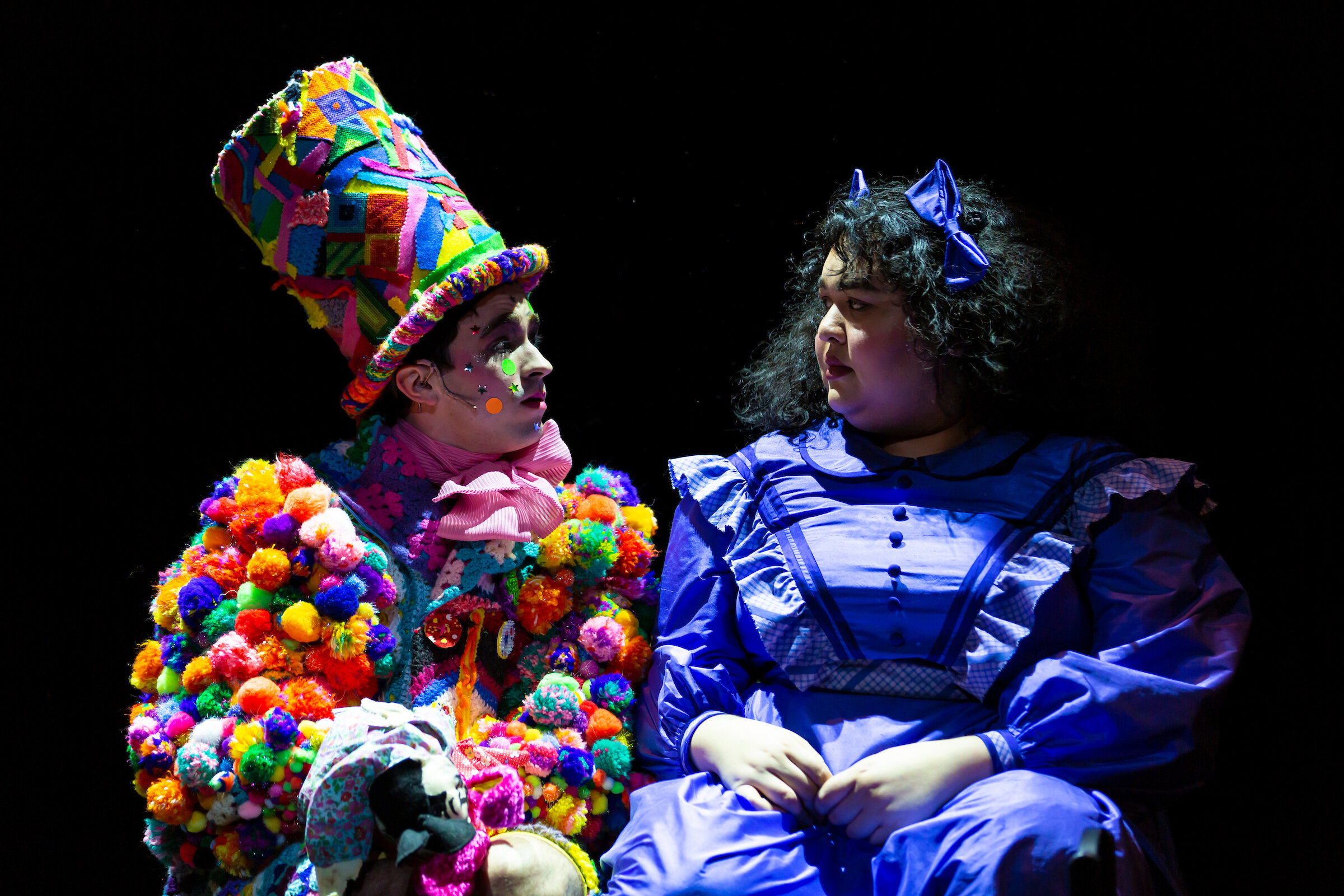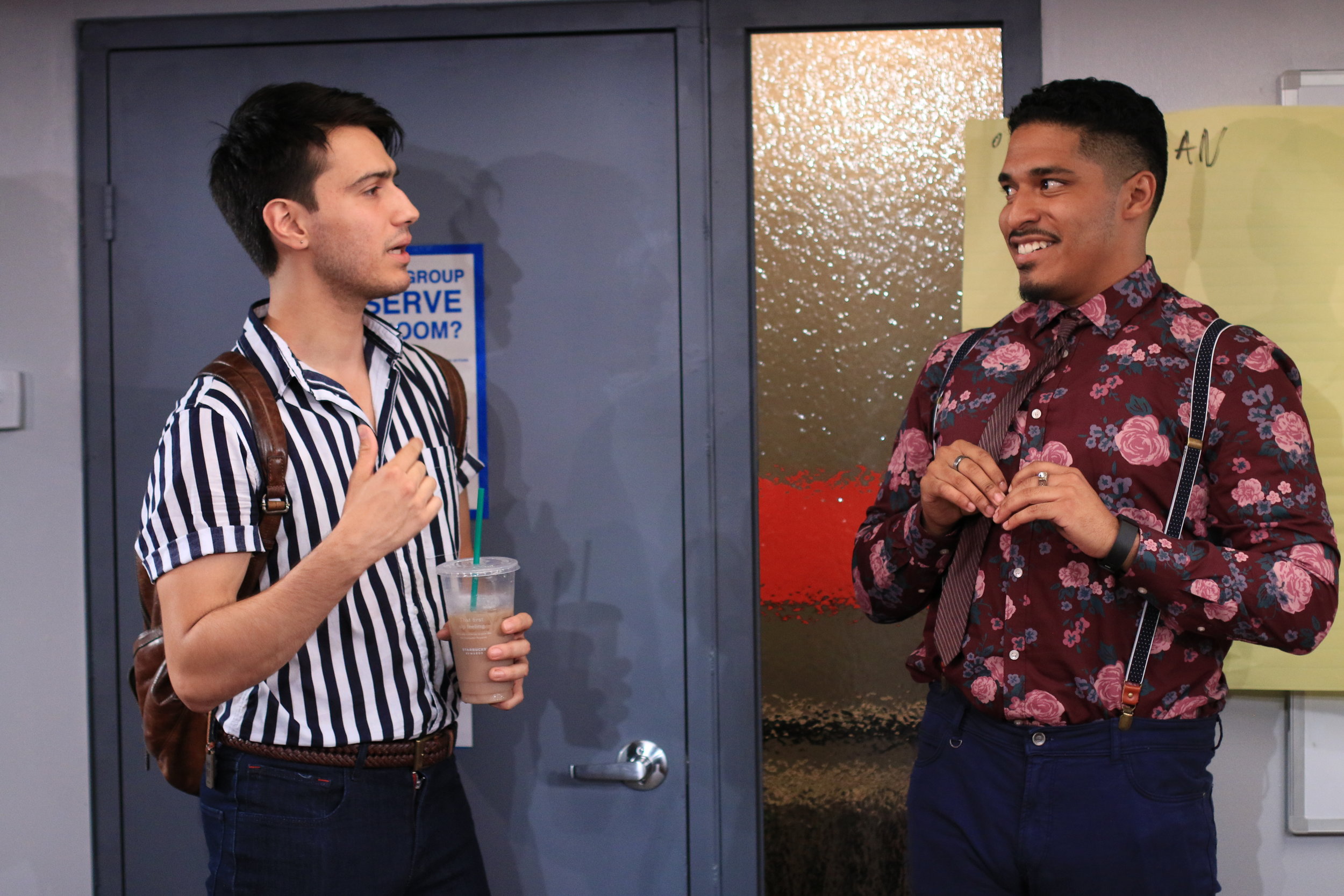Review of Alice, Yale School of Drama
One of the great attractions of Alice, the third show of the Yale School of Drama 2019-20 season, directed by third-year director Logan Ellis, is the prospect of hearing the songs of Tom Waits and Kathleen Brennan sung by someone other than Tom Waits. (And I’m someone who loves listening to Tom Waits!)
That aspect of the show is key because the songs in Alice are sung by characters, most of whom bear some resemblance to characters in Lewis Carroll’s classic and incomparable Alice stories, Alice in Wonderland and Alice’s Adventures Through the Looking Glass (one of the few literary sequels better than the original).
Filtering the adventures of Alice through Waits and Brennan’s Beat carnival sensibility provides a curious and delicious oddity not to be missed. Then filter those songs through arrangements by music director Dan Pardo as sung by some fine voices from the Yale School of Drama that lend them the heft and glow of opera and Broadway and that indeed should be attraction enough.
But consider: Alice, the musical, was developed by avant-garde theater director Robert Wilson, and his stamp on the proceedings, with a libretto developed by Paul Schmidt, further twists the familiar if quizzical terrain in other directions, mainly because Wilson/Schmidt are more interested in real life Alice Liddell (inspiration for our Alice) and Charles Dodgson (Carroll’s actual name) than in Carroll’s creation per se. So the space we travel through here is called Dreamland and watching the show recalled to me one of my favorite puns in Finnegans Wake about “we grisly old Sykos who have done our unsmiling bits on alices, when they were yung and easily freudened.” The Liddell/Dodgson relation is, indeed, frighteningly easy to freuden.
And that lends more than a little perfunctory psyching of the pedophiliac psyche—having to do with Dodgson’s proclivity for photographing pre-pubescent girls, sometimes nude—in what Wilson/Schmidt hath wrought. That aspect mainly impinges in the second half as the script reaches for a through-narrative to hang its symptoms upon, all hinging upon Alice solving “the riddle” of Jabberwocky (the poem of monster-decapitation Alice finds in a book) and, perhaps, beating time. That, for those in need of a plot, may serve as well as anything might, but what matters here is what Waits/Brennan did with their part in all this and it is wonderous indeed, brought vividly to phantasmagoric life by Ellis and his astounding team and cast.
The cast of the Yale School of Drama’s production of Alice, by Robert Wilson, Paul Schmidt, Tom Waits and Kathleen Brennan, directed by Logan Ellis, February, 2020 (photo by T. Charles Erickson)
We begin with screens upon screens that replicate images of Alice (Ilia Isorelýs Paulino) to suggest Dodgson’s photographic fetish (Brittany Bland, projections). Dodgson (Sola Fadiran) opens the show with “Alice,” a song of obsession and melancholy that sets the tone at once. And yet the inspired nature of these characters and their eye-popping costumes by Meg Powers works against Dodgson as a pining pedophile bedeviled by whatever we want to imagine him bedeviled by (Dodgson, a deacon, mathematician and logician, is not a surrealist, not even avant le lettre). What the show makes us face is—yes, obsession and the melancholy of unrequited desire, but it’s the kind we’re apt to have for the figures in our dreams, which may include material from websites, films, shows, books, poems, myths, ritual, and anything in our inner grab-bag.
Mad Hatter (Julian Sanchez), Alice (Ilia Isorelýs Paulino) in the Yale School of Drama production of Alice by Robert Wilson, Paul Schmidt, Tom Waits and Kathleen Brennan, directed by Logan Ellis, February 2020 (photo by T. Charles Erickson)
Anna Grigo’s scenic design creates an open space where the various encounters—each featuring a song or a poem—take place, some—a torture-chamber-like kitchen—having a certain dimension, others— the boat/shop the Sheep (Daniel Liu) navigates—are free-standing sets in their own right. The changeableness of the set perfectly complements the amorphousness of Alice’s imagination as she moves through Dreamland. Done up like a doll, Alice is a mostly willing witness to whatever she encounters. “We’re All Mad Here,” as a song suggests, and Alice gamely takes a “when in Rome . . .” attitude to her interlocutors. Within that world, Dodgson/Carroll is perhaps the Oz-like Wizard behind it all, or at least the dream-father-figure who might help her find a way out. Since Dodgson is also the White Knight and the White Rabbit, he is a kind of all-in-all stopgap; we can call “foul” for the egotistical artist-teacher-master who must insist on his centrality in his protégé’s imagination, but we’re also encouraged to see how the Waits/Brennan songs Fadiran sings—“Fish and Bird” and “Poor Edward” particularly—give us insight into how Dodgson/Carroll understands his own plight. The first ends Act One with a sort of Never-Neverland tableau and duet with Paulino and reprises at the start of Act Two; the second comes late in Act Two and, in Fadiran’s performance, instills a moving sense of the pathos of a creator plagued by his creation.
Charles Dodgson (Sola Fadiran) in the Yale School of Drama production of Alice by Robert Wilson, Paul Schmidt, Tom Waits and Kathleen Brennan, directed by Logan Ellis, February 2020 (photo by T. Charles Erickson)
It’s remarkable how readily Waits/Brennan find beguiling analogs for Carroll’s characters that extend our sense of their possibilities. In a show-stopping moment in Act One, The Caterpillar (Julian Sanchez, in a baroque fantasy of a costume) proclaims his alter ego “Table Top Joe,” a scatting Vegas act that might be Waits’ alter ego as well. Grigo’s design gives Sanchez a thrust space into the audience, and having the Caterpillar undulate into position while singing creates a visual and visceral feat not easy to top. Indeed, Sanchez is a major asset—he gets to wear two amazing get-ups as Mad Hatter (his work with hand-puppets is impressive) and, with Liu, enacts a teasing number—“Altar Boys”—that, while not derived from Wonderland characters per se, plays campy fun with the clerical trappings of Dodgson as an Anglican deacon.
Other stand-out moments include the lovely, demented-Disney of “Flower’s Grave,” sung by a family of flowers (Robert Lee Hart, John Evans Reese, Jackeline Torres Cortés, Adrienne Wells); “Fawn,” in which Paulino and Wells vocalize beautifully; “Kommienzuspadt,” wherein Robert Lee Hart as the Cheshire Cat channels Waits wonderfully; “Reeperbahn,” with Jessy Yates as a kind of BDSM king on a throne of a wheelchair, stirring up tales of naughty indulgence enacted by the ensemble; “Barcarolle,” in which Liu too blends into the Dodgson persona, this time as a motherly, androgynous sheep, and finally, and very memorably, Paulino—as the aged Alice on a cane—singing “I’m Still Here” as a statement of endurance but also of immortal presence within the Dreamland that, for all we know, might go on without us. Paulino’s Alice is childlike, capricious, and slyly reactive throughout, the giddy kid we might like to be again. Being an audience to Paulino’s emotive and moving way with a song has been a joy of her time, now in its third year, at the Yale School of Drama, and her “I’m Still Here” caps that wonderfully.
Humpty Dumpty (Jessy Yates), Alice ((Ilia Isorelýs Paulino) in the Yale School of Drama production of Alice by Robert Wilson, Paul Schmidt, Tom Waits and Kathleen Brennan, directed by Logan Ellis, February 2020 (photo by T. Charles Erickson)
There are a few disappointments: the poems “Jabberwocky” and “You Are Old, Father William,” two of my favorites in the books (and add “The Walrus and the Carpenter,” not referenced here, as a third) sort of get lost in the sauce; the Tweedledee (Cortés)/Tweedledum (Reese) segment, while fun and silly, lacks the manic, violent quality Carroll gives it; and “Lost in the Harbour” is sung by Yates as Humpty Dumpty presented as a projection upon a large, suspended egg. The device seems to limit Humpty Dumpty who, in the book, is a key figure and whose song, here, could use more of the wistful doom found in Waits’ rendition on Alice.
As a musical, the Alice of Wilson, Schmidt, Waits and Brennan, is based on a merging of spectacle and song that creates a world more than a story. Logan Ellis and company fully fulfill that imperative, imaginatively, creatively, and with lasting impressions to spare. “There’s only Alice.”
Alice
Concept by Robert Wilson
Music and Lyrics by Tom Waits and Kathleen Brennan
Libretto by Paul Schmidt
Directed by Logan Ellis
Music Direction, Arrangements, and Orchestrations: Dan Pardo; Scenic Design: Anna Grigo; Costume Designer: Meg Powers; Lighting Designer: Riva Fairhall; Sound Designer: Dakota Stipp; Projection Designer: Brittany Bland; Production Dramaturg: Evan Hill; Technical Director: HaoEn Hu; Stage Manager: Bekah Brown
Musicians: Jillian Emerson, cello; Nate Huvard, guitar; Dan Pardo, piano; Epongue Ekille, violin; Calvin Kaleel, bass; Jose Key, saxophone; Leonardo Marques Starck von Mutius, trombone
Cast: Sola Fadiran, Robert Lee Hart, Daniel Liu, Ilia Isorelýs Paulino, John Evans Reese, Julian Sanchez, Jackeline Torres Cortés, Adrienne Wells, Jessy Yates
Yale School of Drama
February 1-7, 2020









